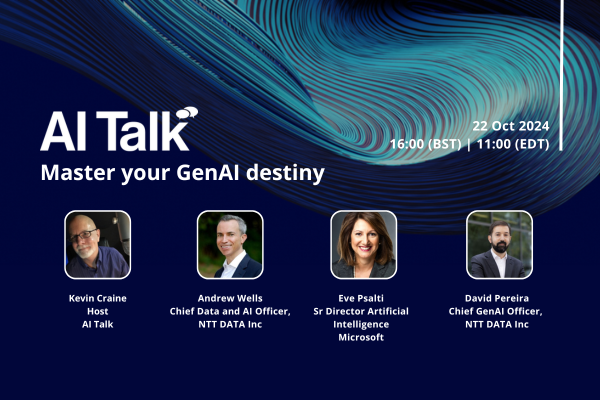Overcoming roadblocks to effective AI use

Nick Hal at Experian UK&I outlines how UK businesses can leverage the true economic potential of GenAI
As we approach the end of 2024, many businesses are beginning to set their strategy for 2025 and beyond. A key priority in this process will likely be how to harness the potential of Generative AI (GenAI), given the technology represents one of the most significant advancements since the Internet’s inception.
What we estimate is that the technology is expected to contribute an estimated £120 billion per year to the U.K economy over the next ten years. Yet, whilst we’re at a crucial juncture with the anticipated growth in GenAI’s capabilities, there are still multiple challenges to address. This includes the need for collaboration, robust regulation, and ensuring access to high-quality data.
A collaborative effort
First and foremost, businesses cannot unlock the full scale of GenAI in isolation, it requires collaboration across the entire ecosystem they operate within. This includes partnerships with third-party organisations, governments and regulatory bodies.
Experian recently partnered with techUK — an association responsible for advocating tech industry growth and innovation — to create a report diving into the potential of GenAI for businesses. The report uncovers how private, public and third-party organisations can join together to provide the most fruitful environment for businesses.
Europe’s AI for Good initiative is a great example of this type of collaboration. It brings together a network of nonprofits and governments across the EU. The purpose of the collaboration is to provide funding, resources and regulatory guidance for businesses to co-develop AI applications and solve challenges across industries in a way that ensures innovation meets the broader economic and societal goals that are of value to everybody.
Pro-growth regulatory frameworks
As GenAI’s presence across industries grows, robust regulation is essential to make sure the technology is implemented responsibly. Both government and regulatory bodies must create a fresh, pro-growth framework that works to foster innovation while safeguarding public interest.
For GenAI integration to be successful, it must operate within, and be compatible with, existing legal frameworks - such as online safety regulations, competition law and GDPR.
For example, the UK Government’s most recent approach to AI regulation is a useful example of this. Built to be used across industries, the flexible, cross-sector framework factors in key principles including safety, security and transparency. Rather than immediately enshrining these into law, the government is encouraging regulators across various sectors to apply these principles using existing legal frameworks, with supplementary guidance where needed.
By requiring selected regulators to publish AI strategic plans annually, starting from earlier this year in April, the framework offers businesses essential direction but remains adaptable to technological advancements. While the framework is not yet legally binding, the government anticipates that targeted legislative interventions will become necessary, especially as AI models become more complex.
Overcoming existing barriers
Barriers to the adoption of GenAI are also found internally within a business. For example, inaccurate, incomplete, or biased data can severely undermine GenAI’s performance.
The research we conducted for the report revealed that 80% of business leaders believe that the quality of their company’s data is critical for the successful implementation of GenAI, which underscores the importance of robust data governance, management, and integration processes.
GenAI thrives on high-quality data, which means data must be sourced from reliable and trustworthy origins. In addition, businesses must use ongoing feedback mechanisms and monitoring systems that can detect and resolve any issues with data quality in real-time.
This will be especially important when you consider Labour’s new Industrial Strategy Green Paper. The strategy outlines a comprehensive plan for the UK’s economic future which discusses how data fuels modern businesses and how more businesses need to analyse their data to generate new insights and knowledge.
Another challenge businesses face when adopting GenAI is the skills gap. Despite many businesses’ willingness to integrate GenAI, there is often a lack of knowledge and expertise regarding how to effectively utilise it from within. No matter the size of the business, it’s important for leaders to look at integrating training frameworks for employees so everyone feels comfortable and confident using the technology.
How does a business approach these sorts of challenges when it comes to adopting GenAI? We formed the GenAI Council, a team of experts from across our business, to ensure we approach GenAI in a safe and responsible manner. Other businesses might prioritise fostering cross-functional team collaboration to integrate diverse perspectives into GenAI deployment.
In either case, the focus of these teams should always be training and development opportunities to close the skills gap. It’s a combination of internal training programmes and on-the-job learning opportunities that will help future-proof a company and give it a chance to thrive with GenAI.
The future of GenAI
GenAI offers a remarkable opportunity to change how businesses operate, but it’s crucial that companies embrace this technology responsibly. By fostering collaboration across sectors, and adhering to regulatory frameworks, businesses place themselves in the best position to successfully integrate GenAI within their operations.
GenAI is here to stay and by adopting a thoughtful, collaborative, and regulated approach - whilst also recognising the practical challenges - businesses can fully embrace GenAI and achieve long-term success.
Nick Hall is General Manager, GenAI CoE at Experian UK&I
Main image courtesy of iStockPhoto.com and ipopba

Business Reporter Team
Most Viewed
Winston House, 3rd Floor, Units 306-309, 2-4 Dollis Park, London, N3 1HF
23-29 Hendon Lane, London, N3 1RT
020 8349 4363
© 2024, Lyonsdown Limited. Business Reporter® is a registered trademark of Lyonsdown Ltd. VAT registration number: 830519543





